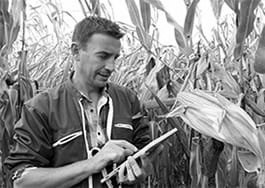Profession farm manager

Mixed crop farm managers plan, organise and coordinate the activities and resources of farming establishments cultivating arable crops.
Farm manager Jobs: Open positions
Find the job of your dreams on Talent.com, one of the largest job sites worldwide.
Job postings: talent.comPersonality Type
Tasks farm manager
- Plan farm strategy, targets, finances and production.
- Decide or advise on the kind of crops to be grown, and the area to be sown or planted.
- Purchase machinery, equipment and supplies, such as seed, fertiliser and chemicals.
- Plan the type, intensity and sequence of farm operations (e.g. determine the best time for planting, spraying and harvesting).
- Recruit, train, direct, coordinate and supervise staff.
- Maintain and monitor quality of produce, ensuring compliance with regulations.
- Establish market strategies, market and arrange for the sale of crops and other farm produce.
- Produce and maintain records of production and finances, and prepare financial and operational reports.
- Apply health and safety standards across the farm estate.
- Organize farm administration.
- Arrange the maintenance and repair of farm buildings, machinery and equipment.
- Perform practical farm work.
Related professions livestock
- Agricultural advisor
- Arable farmer manager, mixed crop
- Artificial inseminator
- Cattle breeder
- Cattle station helper
- Dairy producer
- Herdsman
- Livestock breeder, all other
- Livestock dealer
- Livestock farm manager
- Livestock farm worker
- Livestock farmer
- Livestock machinery installer
- Livestock machinery mechanic
- Pig breeder
- Poultry producer
- Quality inspector cattle, meat, fish
- Stockman
- Subsistence livestock farmer
- Veterinarian inspector
- Veterinarian, all other
- Veterinary aid
- Veterinary practitioner
- Veterinary technician
- Veterinary vaccinator
Knowledge
- Agronomical production principles
The techniques, methods and principles of conventional agronomical production.
- Pollution prevention
The processes used to prevent pollution: precautions to pollution of the environment, procedures to counter pollution and associated equipment, and possible measures to protect the environment.
- Environmental policy
Local, national and international policies dealing with the promotion of environmental sustainability and the development of projects which reduce negative environmental impact and improve the state of the environment.
- Agricultural business management
Understand business principles behind agricultural production and the marketing of its products.
Skills
- Negotiate loan agreements
Negotiate with banking professionals or other parties functioning as lenders in order to negotiate the interest rates and other aspects of the loan contract in order to obtain the most beneficial agreement for the borrower.
- Supervise hygiene procedures in agricultural settings
Ensure that hygiene procedures in agricultural settings are followed, taking into account the regulations of specific areas of action e.q. livestock, plants, local farm products, etc.
- Manage farm products
Manage the farm products by making contracts with customers and business partners to ensure the optimal production, taking into account the farms production plans and purpose.
- Manage farm supplies
Manage farm supplies by taking care of the purchase and storing procedures. Select and purchase supplies and equipment such as seeds, livestock feed, fertilisers and farm machinery.
- Operate farm equipment
Supervise the smooth running of farm equipment which can include high pressure cleaning equipment, heating or air conditioning and monitor the temperature of premises. Make sure tractors and other vehicles are running smoothly. Interpret instructions given by computer programs and report simple operations.
- Manage production enterprise
Organise and instruct staff, plan production strategies and programmes including sales. Carry out input purchase orders, materials, equipment and manage stocks etc. Awareness of demands of the businesses customers and adjustments accordingly to plans and strategies. Estimate resources and control budget of enterprise applying business economics, production development and project management principles.
- Assess the necessity of new farming technologies
Evaluate the development of new technologies and ideas and make decisions as to their use and appropriateness to a given farming situation.
- Present the farm facilities
Perform customer adapted presentations of the farm organization and farm processes taking under consideration the farm sustainability and local environment.
- Market farm products
Market the products of the farm. Make sure that the product is ready for marketing and introduce the products to customers by using appropriate marketing methods.
Optional knowledge and skills
manage livestock handle chemical products for soil and plants livestock species maintain farm equipment use a computer livestock implement marketing strategies plant disease control manage plans for the storage of organic by-products report pollution incidents manage plans for the utilisation of organic by-products pest control in plants maintain plant health manage mechanically controlled livestock production environments maintain plant soil nutrition train employees estimate harvest costs monitor forage grazing plans implement sales strategies create crop protection plans manage the health and welfare of livestock create soil and plant improvement programmesSource: Sisyphus ODB